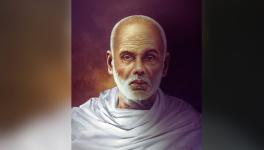Kejriwal’s Hypocrisy: Voted to Scrap Art 370, now Cribs About MCD Election
There is more than a ring of hypocrisy to Aam Aadmi Party leader and Chief Minister Arvind Kejriwal’s tirade against the postponement of the elections to the Municipal Corporation of Delhi (MCD). He accused Prime Minister Narendra Modi and his Bharatiya Janata Party of subverting Indian democracy and said the postponement was an ominous sign for the future.
Kejriwal’s charge is, indeed, true, for a month before the MCD elections were due, the Modi government tabled, on 25 March, the Delhi Municipal Corporation (Amendment) Bill in the Lok Sabha. The Bill unifies all three MCDs into one, appoints a “special officer” for running the unified MCD, and reduces the number of wards from 272 to 250. This made the postponement of the MCD election inevitable.
But Indian democracy was not imperilled for the first time on 25 March. In fact, it was on 5 August 2019, amidst much celebration. On this day, Article 370 was read down, rather scrapped, and the region of Ladakh was hived off from Jammu and Kashmir, which was demoted from being a state into a union territory.
On the same day, at 1.05 pm, Kejriwal tweeted, “We support the govt. on its decisions on J&K. We hope this will bring peace and development in the state.” Peace Kashmir was to have at gunpoint, evident from the state being placed under lockdown even before the Bill to reorganise J&K was tabled in Parliament. The AAP voted in favour of that Bill.
When Kejriwal could support the Modi government’s decision to deprive J&K of its special identity, a promise given to its people at the time of its accession to India, when the Lieutenant Governor rules the Union Territory of J&K and its Assembly elections are delayed by two years, might we not ask Kejriwal: Why should we lose sleep over the postponement of the MCD polls?
In the Delhi Assembly, Kejriwal explained why. Erudite AAP leader and MLA Atishi echoed Kejriwal’s argument in a piece she wrote for the Indian Express: “Today, the MCD elections are being postponed. Tomorrow, if the BJP is losing the Gujarat elections scheduled in the month of December, can they not bring a bill to unify Gujarat and Maharashtra and thereby postpone the elections?”
Atishi went on to argue that the BJP could even amend the Representation of the People Act, 1951, and bring the entire country under the rule of a non-democratically nominated administrator. These were precisely the points she should have made to Kejriwal at the time he took the decision that the AAP should vote in favour of reading down Article 370.
Did she?
But social media users did, in fact, point to Kejriwal the folly of his Kashmir decision. For instance, one Nitin Chavan tweeted his reply to Kejriwal, “If they can reduce status of J&K to glorified municipality they can as well reduce status of Delhi to one without legislature.” His next few words were prescient, “Then do not ask for support on basis of representative democracy.”
Kejriwal and Atishi may not have asked for our support, but they are doggedly trying to kindle fear in us about our democratic future.
Kejriwal’s talk of his concern for democracy has become morally hollow, as is also true of his party members like Atishi. In June 2018, Kejriwal sat on a nine-day sit-in in the office of Anil Baijal, the Lieutenant Governor, claiming that IAS officials in the Delhi administration had gone on strike at his and the Central government’s behest. Four non-BJP chief ministers—West Bengal’s Mamata Banerjee, Karnataka’s HD Kumaraswamy, Kerala’s Pinarayi Vijayan and Andhra Pradesh’s N Chandrababu Naidu—came to meet Kejriwal during the sit-in, but were denied permission.
They came to meet Kejriwal to not only express their solidarity with him but also because they could see the Modi government eroding the federal principle enshrined in the Constitution. For the man who has constantly demanded full statehood for Delhi, it was quite bizarre and hypocritical to see him vote for the reading down of Article 370.
Contrast him with former chief minister Omar Abdullah’s position when the National Capital Territory of Delhi (Amendment) Bill, 2021, which sought to give more powers to the Lieutenant Governor, was introduced, in March 2021, in the Lok Sabha. Abdullah said, “In spite of AAP’s support for the dismemberment and downgrading of J&K in 2019, we still condemn this assault on the powers of the elected government of Delhi.”
But the Kashmir issue is not a solitary example of Kejriwal’s political amorality. Even before the 2019 Lok Sabha election results were announced, Kejriwal told a newspaper that the AAP would not win in Delhi because the Muslims decided to ditch his party and vote for the Congress.
“Until 48 hours before polling, it seemed like all seven seats will come to AAP. But at the last moment, the complete Muslim vote got shifted to Congress. We are trying to figure out what happened,” Kejriwal said.
His disappointment may have been understandable, but the results showed how misplaced his calculations were. The BJP won all seven Lok Sabha seats in Delhi and polled 56.86% of the total votes polled. In effect, it meant that even if the AAP-Congress had stitched an electoral alliance or all Muslims—who are 12-13% of Delhi’s population—had voted for Kejriwal’s party, the BJP would have still won all seven seats.
Kejriwal, obviously, never apologised to Muslims for blaming the AAP’s 2019 debacle on them. It does speak of his mindset that he never accused the Baniyas, the caste to which he belongs, for the drubbing the party received in Chandni Chowk, where his caste calls the shots. Pankaj Kumar Gupta, the AAP’s candidate there, polled well over four lakh fewer votes than the BJP.
The 2019 election prompted Kejriwal, as it has many others, to publicly display his Hinduness, adopt Hanuman as his icon, and visit temples. This is his right. At the same time, though, he also stopped speaking on the insecurity and fear of Muslims. Yet for all his passion for Hindus, his residence was attacked on the issue of Kashmir Files.
Kejriwal did not, for instance, visit Delhi’s Shaheen Bagh, where Muslim women had organised an indefinite sit-in against the new citizenship law. The protesters understood Kejriwal’s dilemma, for they knew the BJP would exploit his visit to polarise the electorate. But what they cannot still fathom is why he kept away from Shaheen Bagh even after sweeping the Delhi Assembly election.
Kejriwal’s decision to support the abrogation of Article 370 has to be viewed in the context of his lurch to the Hindu Right. And Atishi has become a symptom of the AAP’s Hindu Right politics.
For a person who studied at Springdales School, St Stephen’s College and Oxford University, Atishi’s political metamorphosis shows quality education need not bolster a person’s moral convictions. She dropped Marlena, a surname given to her by her parents as their tribute to Marx and Lenin because it was claimed that the BJP, during the 2019 Lok Sabha campaign, was portraying her as a Christian. In 2020, she became Atishi Singh, subtly depicting her Rajput identity.
In 2021, Atishi’s moral fall hit a new low. Days before the India-Pakistan T20 World Cup match, Atishi thundered, “We see people being attacked in Kashmir. I am sure that even the prime minister agrees with the stand of not conducting the match as when [the BJP was] in opposition he used to question that when state-sponsored terrorism is taking place, why should we play cricket with them?”
Atishi’s statement shows that as far as Pakistan goes, she and her leaders are better Hindus than those in the BJP. Wonder what her Marxist-Leninist parents thought of her line of attack against the BJP!
In the Indian Express article, Atishi said, “The Delhi Municipal Corporation (Amendment) Bill could be the beginning of a vicious cycle of abuse of power by the Central government, which, if not opposed now, could lead to a situation where the elections in this country will be held at the behest of the ruling party.”
No, ma’am, this “vicious cycle” began on 5 August 2019.
In case she and Kejriwal have a sliver of moral conviction in them, they should publicly repent for their support to the reading down of Article 370. When Kejriwal can apologise to Akali Dal Bikram Singh Majithia for accusing him of being involved in the drug trade, atonement for the sake of Indian democracy should come easily to him—and Atishi Singh.
The author is an independent journalist. The views are personal.
Get the latest reports & analysis with people's perspective on Protests, movements & deep analytical videos, discussions of the current affairs in your Telegram app. Subscribe to NewsClick's Telegram channel & get Real-Time updates on stories, as they get published on our website.
























